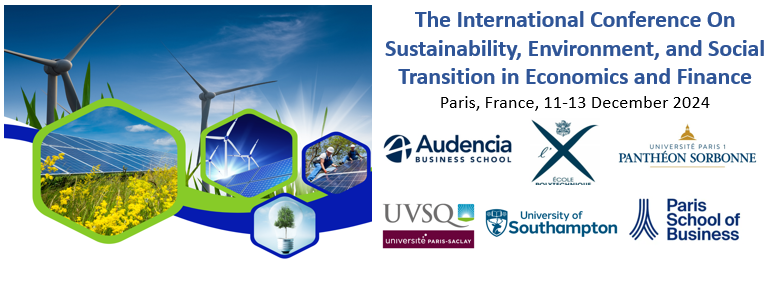Call for papers
As we convene at SESTEF 2024, we recognize the urgency of the economic and financial issues discussed at COP28 and the imperative for academia, policymakers, and practitioners to come together to advance solutions and drive meaningful change. In light of recent global developments, particularly the outcomes of COP28, SESTEF 2024 assumes even greater significance. The insights and agreements reached at COP28 provide a crucial backdrop for the discussions and analyses to be conducted at SESTEF 2024. Building upon the momentum generated by COP28, SESTEF 2024 aims to serve as a crucial platform for academics, policymakers, and practitioners to engage in meaningful discussions and critical analyses of the pressing issues and challenges concerning energy, environment, sustainability, social transition, economics, and finance, aligning with the global imperative for a sustainable and resilient future. With a focus on stimulating collaboration and knowledge exchange, SESTEF 2024 provides an invaluable opportunity for stakeholders to come together and explore innovative solutions to address the complex interplay of these themes. The main topics covered include, but are not limited to:
I. Climate Risks and Corporate Finance
- Carbon Disclosure and Risk Management
- Carbon Risk and Firm Value
- Climate Risks in Mergers & Acquisitions
- Climate Risks, Corporate Sustainability and Resilience
- Climate Risks and Digital & Financial Technologies
- Climate Risks and Regulation
- Corporate Social Responsibility and Sustainability
- Economic and Financial Implications of Climate Risks
- Equity and Debt Costs in a Low-Carbon Economy
- Green Corporate Governance
- Role of Diversity, Equality and Inclusion in Climate Corporate Finance
- Stranded Assets and Energy-Intensive Firms
II. Energy Markets and Sustainability
- Behavioral Aspects of Energy Markets
- Climate Risks and Energy Markets
- Digitalization and Energy Markets
- Econometrics of Energy Markets
- Electricity Networks, Smart Grids, and Demand-Side Management
- Energy Security
- Emissions Trading Systems and Energy Sustainability
- Financialization of Energy Markets
- Hydroelectricity and Water Management
- Innovative Pricing Models for Sustainable Energy
- Interaction between Energy and Financial markets
- Shifts in Energy Market Structures, Technologies, and Regulatory Frameworks
III. Resource Policy and Environmental Economics
- Analysis of Carbon Cycle
- Analysis of Renewable and Non-Renewable Resources and Resource Policy
- Degradation of Natural Resources and Health Issues
- Environmental Aspects of Agricultural Economics
- Environmental Behavior and Responses to Regulation
- Evaluation of Environmental Policy
- Institutional Arrangements and Resource Management
- Intergenerational Choices under Global Environmental Change
- Modeling and Simulation in Environmental Economics
- Natural Resources, Risk, Social Preferences and Welfare
- Resource Pricing and Valuation of Environmental Goods
- Resource Scarcity and Optimal Capital Accumulation
IV. Transition to Carbon-Neutral Energy Systems
- Application of AI, Machine Learning and Big Data Techniques for Developing Carbon-Neutral Energy Systems
- Circular Economy and Energy Transition
- Clean Energy Conversion Technology and Biomass Energy Utilization
- Economic and Financial Aspects of Decentralized Energy Systems
- Economic and Financial Aspects of Energy Security
- Economic and Financial Aspects of Energy Storage Technologies
- Energy Policies for Low Carbon Transportation
- Funding Transition to Carbon-Neutral Energy Systems
- Just Transition and Social Equity
- Life Cycle Assessment of Energy Systems
- Low Carbon and Renewable Technologies
- Nuclear Energy and Low-Carbon Alternatives
V. Economic and Financial Aspects of Biodiversity and Nature-Based Solutions
- Biodiversity Loss and Economic & Financial Impacts
- Biodiversity Metrics in Corporate Reporting
- Biodiversity Net Gain in Development Projects
- Biodiversity-Positive Business Strategies
- Commodification of Nature
- Financial Instruments for Scaling Nature-Based Solutions
- Integrating Nature-Based Solutions with Climate and Biodiversity Goals
- Investment in Biodiversity Conservation
- Human Well-Being and Ecological Health
- Natural Capital
- Nature-Based Solutions and Biodiversity Co-Benefits
- Sustainable Agriculture and Food Security
VI. Sustainable Finance
- Cultural Aspects of Sustainable Finance
- ESG Investment, Performance, and Reporting
- Funding Circular Economy Models
- Green and Sustainable Banking, Central Banking, Finance, and Insurance
- Green and Sustainable Financial Instruments
- Impact Investing and Sustainability Objectives
- Role of Diversity, Equality and Inclusion in Green and Sustainable Finance
- Socially Responsible Investment
- Sustainable Finance and Sustainable Development
- Social Bonds and Sustainable Infrastructure
- Sustainable Real Estate and Resilience
- Weather Derivatives
Interested authors can submit their Extended abstracts or complete papers (in PDF files), no later than September 30, 2024 via the conference website:
Note:
- The first page of your submission must contain the title, authors’ names, and the corresponding author’s contact details.
- While multiple submissions are permitted, each author may present only one paper.
|


